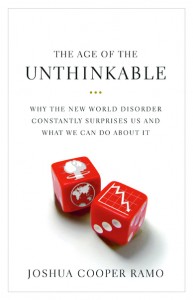Estimated reading time: 2 minute(s)
 I just finished the book I began earlier this summer, The Age Of The Unthinkable. As I had mentioned earlier, the book presents a very intriguing look at the world as it currently is, partly due to the great amount of first-hand knowledge and experience that its author, Joshua Cooper Ramo, has with today’s world and some of its most influential people.
I just finished the book I began earlier this summer, The Age Of The Unthinkable. As I had mentioned earlier, the book presents a very intriguing look at the world as it currently is, partly due to the great amount of first-hand knowledge and experience that its author, Joshua Cooper Ramo, has with today’s world and some of its most influential people.
Story after story backs up a few central themes to his book: in this currently unstable and unpredictable world (politically, financially, culturally) one needs to be resilient, adaptive, and move towards a decentralized model of operating (be it politically, or in business) and always be aware of your environment—how everything is effected by and affects everything and everyone around it. Relationships are key, as is the power and responsibility of each individual.
What I found to be so intriguing were the success stories of companies and hospitals and other organizations entrusting individuals with more responsibility and ownership (and thus, retaining less centralized control over organizational structures). This goes against perhaps our natural instinct, and the current model of thinking. However, in many cases (and from my own experience) the more you spread out the power and ownership of an organization, the greater the innovation and production of that group of people. We are individuals, and our greatest desire is freedom… when we are granted that, we most often flourish. (And then, so does the organization we are aligned with.)
Ramo told of a doctor who trusted his illiterate, uneducated patients with a very complex treatment, and it worked. Where, the government had spent millions of dollars attempting to respond to another disease and, when those same people were treated as numbers rather than individuals, the treatments were abandoned and the people died. Given respect and choice and education, the people flourished. Given no choice and treated like parts of a machine, they perished.
There were so many great first-hand stories of successful adaptations to a rapidly changing world. It really was both encouraging and challenging. The book ends with the question, what will your part be in this world? Ramo puts forth the idea that another characteristic of this age is that we all have a role. I believe that’s true. We are all very interconnected and all have access to much more information and means of communicating and acting than ever before.
Definitely a well-written, intriguing book. I highly recommend.
